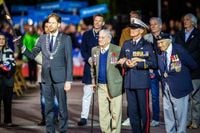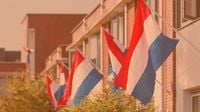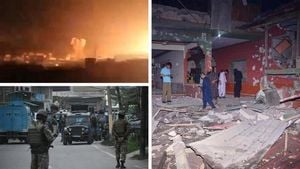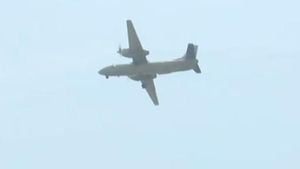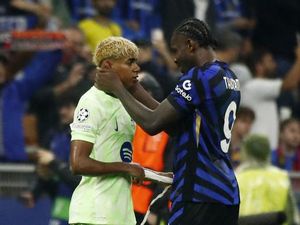WAGENINGEN, Netherlands -- The Netherlands marked the 80th anniversary of its liberation from Nazi German occupation on May 5, 2025, with a series of heartfelt ceremonies and celebrations. Dozens of World War II veterans gathered in the central Dutch town of Wageningen, where the historic surrender documents were signed on May 5, 1945, at the Hotel de Wereld, formally ending the brutal five-year occupation as the war drew to a close across Europe.
Festivities kicked off shortly after midnight when the freedom flame was lit on 5 Mei Plein in Wageningen. The flame was ignited by two centenarian veterans: Mervyn Kersh, a 100-year-old from Britain, and Nick Janicki, 101, from Canada, alongside local mayor Floor Vermeulen. This symbolic act marked the beginning of a day filled with remembrance and celebration.
Approximately 50 veterans from around the world were expected to attend the celebrations, which included a military parade, communal meals, and various speeches. The main events took place in the afternoon, with the weather turning favorable, featuring mostly dry conditions and temperatures reaching up to 15 degrees Celsius inland.
As part of the ceremonies, Polish Prime Minister Donald Tusk delivered a poignant speech emphasizing the importance of European and transatlantic unity in the face of modern threats. He stated, “In the face of the threat posed by (President Vladimir) Putin’s Russia, we need to deepen our European and transatlantic life, and we need genuine solidarity.” Tusk's address resonated deeply with the audience, especially given the historical context of Polish troops being among the Allied forces that liberated the Netherlands.
During the ceremony, Tusk was momentarily interrupted by a small group of protesters who shouted pro-Palestinian slogans. The demonstration, which resulted in five arrests, highlighted ongoing global tensions that overshadowed the day’s celebrations. Dutch Defense Minister Ruben Brekelmans also called for renewed efforts to nurture peace, stating, “War and aggression are back in Europe, and it is up to us to protect peace.”
However, the event took a concerning turn when a smoke canister was thrown onto the stage where Tusk and his Dutch counterpart, Dick Schoof, were standing. Fortunately, there were no immediate reports of injuries, and Tusk was swiftly removed from the stage for his safety.
The day’s events also included a moment of silence observed on May 4, when Dutch King Willem-Alexander laid wreaths at the national monument in Amsterdam. This solemn occasion was followed by the lighting of the Liberation Fire, symbolizing the enduring spirit of freedom and resilience.
The Netherlands' Liberation Day is celebrated annually on May 5, a day after the country observes two minutes of silence to honor its war dead. This year, the commemoration was particularly significant as it marked eight decades since the end of World War II, a conflict that profoundly impacted the nation and its people.
In the lead-up to the anniversary, the government announced funding to support the numerous free festivals that take place across the country. Around one million people typically visit one of the 14 official freedom festivals each year, making it a crucial part of the national identity and remembrance.
As part of the celebrations, around 5,000 runners carried torches to 201 locations across the Netherlands, spreading the message of freedom and unity. The traditional closing concert on the Amstel River, featuring the classic Vera Lynn song “We’ll Meet Again,” was scheduled for the evening, with the royal family in attendance.
Reflecting on the historical significance of the liberation, Prime Minister Dick Schoof shared a personal story about the grief his family felt over the death of his grandfather, executed by Nazi soldiers for his resistance work. He remarked, “On this day, in the two minutes of silence, that echo sounds extra loud. When we think of all the people who were murdered for who they were, who died of hunger or exhaustion, or who fought for peace and freedom — our peace and freedom.”
The Netherlands experienced a complex liberation timeline, with its southern regions freed in 1944, while the populous western regions endured the devastating Hunger Winter, which claimed thousands of lives due to famine.
As the celebrations unfolded, the atmosphere was a mix of remembrance and hope for the future. The events served not only as a tribute to those who fought and suffered during the war but also as a reminder of the ongoing struggles for peace and unity in Europe today.
With the backdrop of current geopolitical tensions and the fraying traditional links with the United States, the words of leaders like Tusk and Brekelmans echoed the need for solidarity and cooperation among nations. Tusk concluded his speech by calling for “genuine solidarity between people and nations that will prevent the evil from shaping our present and future.”
As the day came to a close, the Netherlands stood united in its remembrance, celebrating not only its past but also its commitment to a peaceful future.
